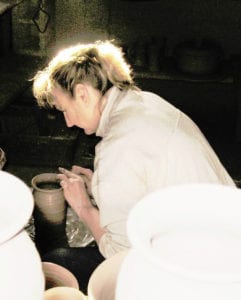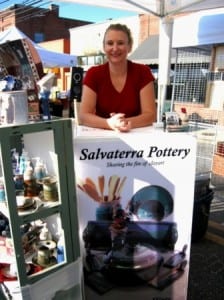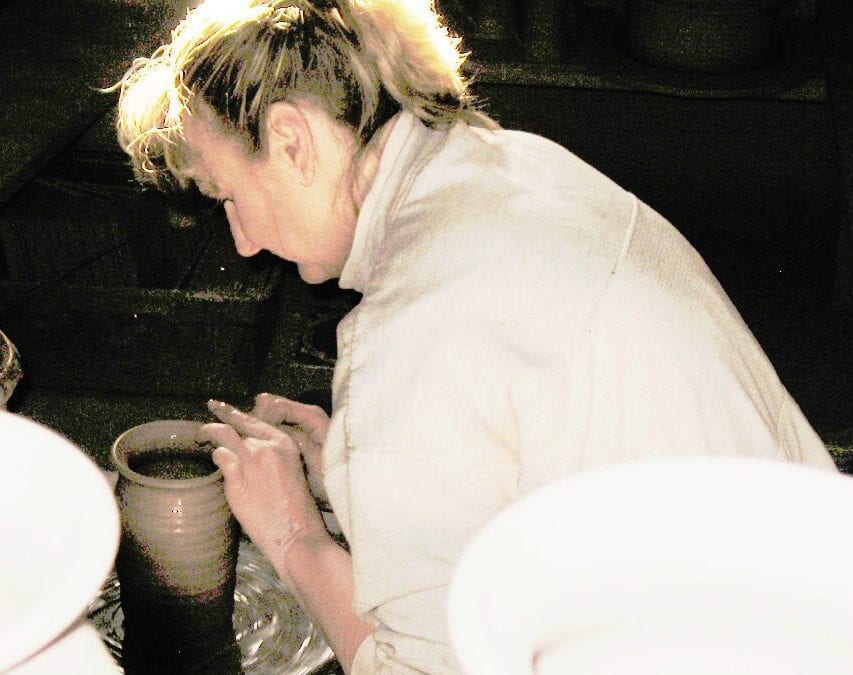Reaction to Starting the Pottery Business
When you say, “I want to start a pottery business”, you can see it on most

Early years at the wheel
folks’ faces. Few believe you will be successful. Most think that might be a nice hobby or side business. But no one, including me, ever thought we would be where we are now. I even had a potter tell me I couldn’t make a living as a potter. When I really think about it, only my husband said I should do it. Everyone else said I couldn’t do it or said nothing at all.
Still til this day, when I tell people I’m a potter and they don’t know us, they immediately assume that I’m kinda playing around and selling a few pots. No one can make a living as a potter, right?
How Do You Know You Should Persue Your Dream?
When the first thing you think of when you wake up is pottery. When the last thing you think of when you go to bed is pottery. When you wake up in the middle of the night with a new pottery idea. Guess what? Your a potter and you need to be pursuing this dream.
For me, it really didn’t seem like a choice. It was more of how am I going to do this than should I do this. So once you know deep in your soul that you need to try this crazy idea, the next question is how?

How We Started Out
After a few years of studying clay at UNCA and selling my work at the student sales each semester, I had decided to move forward. I took the cash I made at each of the student sales and started buying equipment for my own studio. First I bought a used wheel, then a kiln and then an extruder. I had about 200 square feet in a basement to make my pots.
I took a couple of classes at the local technical school to learn what I needed to do to register my business name and all of the legal stuff and basically did each of these things one by one until the business was officiall set up. I knew nothing about doing this initially but it wasn’t as big of a deal as I thought it was.
I was still working full-time at UNCA, when I juried into my first professional craft show in Asheville. The show went well and I was struggling with working full-time at the university and trying to make pots at the same time, so I found a part-time job at the university and started making pots half-time and did this for a year and a half and then became a potter full-time.
Financing the Business
I am financially conservative and we had a 5 year old and a mortgage on our first house so we were going to be plan full with our choices. Until a year ago, we never used credit to build the business. The pottery always paid for itself and brought in income for the family. So as more money came in to the business, we used some of it to build the business and lived off of the rest.
After 21 years in the business, we took out our first loan to build the commercial facility we are in now. Even with this choice, we made sure that we were already earning enough money from the business to cover the added expenses and mortgage.
The Early Years
The Asheville Area is an ideal place to have an art business. Locally there are many venues to sell your work and people come from all over to buy art work. So I already had that going for me.

Weaverville Craft Show
I booked about 7 – 10 craft shows a year. I would talk to the more experienced crafters at the shows to find out which shows to do and which ones to avoid. And my first store that would sell my work was in my home town and was a consignment store.
I slowly got more and more galleries to sell my work locally. Sometimes gallery owners would ask if they could sell my work when I was at a show. And many times, I would go from town to town with a box of pots for “show and tell”. I’d walk the entire town and prioritize which shop in each town I would ask to buy my pots. Some would say yes. Initially, many said no. I wasn’t afraid of investing in myself by doing consignment, rather than selling wholesale. To this day some of our best selling galleries are consignment.
Over the years, we have built up several galleries that sell our work. In the last several years we have chosen not to do craft shows anymore. Craft shows are a hard way to make a living and have become readily available and aren’t as unique as they once were. Many customers have continually been collecting our work and with our new studio and gallery, we have built up even more business.
Final Thoughts….
From the very beginning, I always wanted to present myself as a professional. I had printed material such as wholesale pricing sheets, business cards and when websites became a thing, my husband built my first website.
I am not the most gifted, creative, skilled potter. I am and always was committed to learning and improving my skills. And I am dependable. If I say I’m going to do something, I do it. I know of more talented potters than I, who lost gallieries I still sell to because they couldn’t fill orders in a timely fashion. Getting pottery to galleries in a timely fashion is more rare than you might think.
Now in year 22, I still work more than a 40 hour week. Owning your own art business isn’t for the lazy.
I treat my customers as I would want to be treated. If I make a mistake, I do my best to make it right, even if it ends up costing me financially. And even though I have employees, there isn’t a job I still don’t do myself.
Like I said earlier, I never expected to get this far with Salvaterra Pottery. My goal was to make enough money to replace my income at UNCA. I never expected or thought I would have employees. And I certainly didn’t expect to have the beautiful studio and gallery we have now. Were the major decisions in this business scary? Yup. Did I make many mistakes along the way? Yup. Am I thankful for this journey? Yup
Dreams for the Future
So what am I dreaming about now? I’d like to add other artist studios to the property we have our studio on. I’d like for my husband to fulfill his dream to become a full time woodworker. And I’m looking for the next generation potter to take over Salvaterra Pottery for when I can no longer make pots. I’d like to mentor him or her to do so.

Building the Studio

